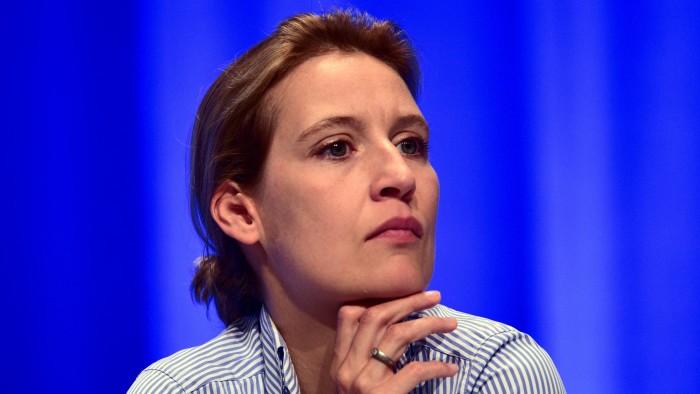A growing Alternative for Germany attracts some unsavoury members

Simply sign up to the German politics myFT Digest -- delivered directly to your inbox.
Alice Weidel objects to gays being called a “degenerate species”. Particularly when the insult comes from her own political party.
A former Goldman Sachs banker who is herself in a same-sex relationship, Ms Weidel is a senior figure in Alternative for Germany, the rising force in German politics. Though formed just three years ago it has already won seats in 10 of Germany’s 16 regional parliaments.
But with greater popularity has come greater scrutiny — particularly of AfD politicians on the right of the party. One is Kay Nerstheimer, who won a seat in local elections in Berlin earlier this month, but was forced to resign the party whip after details emerged of his extremist past.
Mr Nerstheimer had been a member of the extreme-right, Islam-hating German Defence League. He had described Syrian refugees on his Facebook page as “disgusting worms”, and asylum-seekers as “parasites, who feed off the life juices of the German people”. Gays, meanwhile, belonged to a “degenerate species”.
His is not an isolated case. This year, one AfD lawmaker was outed as an anti-Semite while one of the party’s candidates was caught selling Nazi paraphernalia.
Ms Weidel, who describes herself as a “hardcore liberal”, is horrified. “The AfD must weed out these people as rigorously as possible,” she said in an interview. “With them in our ranks, we will never be able to govern.”
Feisty, populist and unapologetically anti-immigration, the AfD portrays itself as an insurgent movement that is breaking the mould of German politics. It claims — with some justification — to be a broad church that has attracted defectors from both the left and right: indeed, polling data show it has stolen votes from Angela Merkel’s Christian Democrats and the centre-left SPD in almost equal measure.
But the Nerstheimer scandal risks undermining the party’s crossover appeal and turning off mainstream Germans, who, mindful of their country’s Nazi past, are repelled by all forms of political extremism.
It is a dilemma other fast-growing European populist parties, such as the UK Independence Party, have grappled with. Often such organisations grow so quickly that they lack the resources to properly vet candidates.
“The risk is that a lot of people who voted for the AfD as a protest but who in principle identify with democratic values will turn their back on the party,” says Everhard Holtmann, a political scientist at Halle-Wittenberg University. He predicts the AfD itself could see an exodus of activists and lawmakers “if the leadership fails to domesticate, or exclude, people like Nerstheimer”.

The AfD began life in 2013 as a Eurosceptic party opposed to the Greek bailouts, and many of its early members were liberals and academics. But the party later lurched to the right, capitalising on popular anger with Chancellor Merkel’s open-door refugee policy.
Many of the original members have watched with dismay the growing influence of the nationalist, xenophobic right. Markus Egg, a Berlin-based academic, says the university he works in is “a very multicultural, international environment”, and he wants the AfD to be a party “that is open to foreigners”. For that reason, he finds the Nerstheimer affair “troubling”.
Yet he has no plans to quit — for the moment, at least. “Still, I’ll be monitoring closely what’s happening,” he says. “My personal view is that people [like Nerstheimer] should be kicked out as quickly as possible.”
There are others. Rudolf Müller, an AfD politician in the western state of Saarland who runs an antique shop, was recently discovered to have been peddling swastika-decorated medals and concentration camp money — a crime in Germany.
Jörg Meuthen, the party’s national leader, said such behaviour was “incompatible with membership of the AfD”, adding: “He himself is aware of that.” Mr Müller later blamed “pig journalism” for the controversy.
The incident comes just months after Mr Meuthen had to grapple with a similar scandal involving Wolfgang Gedeon, an AfD politician who was elected to the regional parliament of Baden-Württemberg in March.
After Mr Gedeon took up his seat, German media quoted from books he had written in which he demonised Jews and trivialised the Holocaust. In one, he said that the “Talmudic Ghetto Jews are the internal enemy of the Christian West”. In another, he claimed that the Protocols of the Elders of Zion, a notorious forgery which alleges a Jewish plot to rule the world, were authentic.
Mr Gedeon later resigned from the AfD faction in the Baden-Württemberg parliament — which is led by Mr Meuthen — but only after the faction split over whether to expel him.
“With people like this we have a real credibility problem,” says Ms Weidel, “because they completely counteract all the work done by more moderate AfD members on a voluntary basis.”
Getting rid of the bad apples, however, is no easy task. It is notoriously difficult to exclude members of a political party in Germany. AfD officials point to the case of Sebastian Edathy, a Social Democrat MP who was accused of downloading child porn: earlier this year, SPD leaders failed in their attempt to kick him out of the party.
Ms Weidel also dismisses the view that the Nerstheimer and Gedeon affairs speak of a deeper malaise in the party. “I wouldn’t say so, considering we only have two such cases among all the AfD lawmakers that have been elected,” she says.
Comments